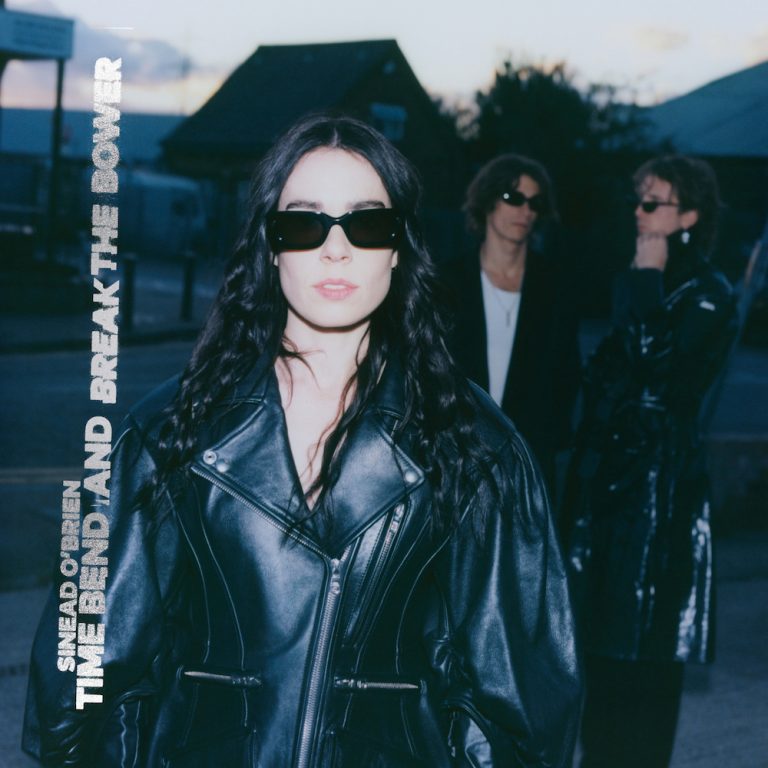In addition to being a poet and musician, London-based Dubliner Sinead O’Brien is also a senior fashion designer for Vivienne Westwood, and in many ways her identity as a fashion designer is inseparable from the identity of her debut album Time Bend and Break the Bower.
On the album cover, O’Brien sports a half-zipped leather jacket and stylish black sunglasses – as do her bandmates in the background, Julian Hanson and Oscar Robertson, who look as though they’ve been candidly snapped mid-conversation. O’Brien’s name and the album title run down the album’s sleeve slightly askewed, in a spliced, metallic font. This rich, expressive aesthetic is deliberate and purposeful – having been maintained across all the photoshoots and music videos for this era of O’Brien’s career.
Yet, just like the text on the album cover, this aesthetic often runs slightly askew to the music itself. Sure, Time Bend sounds fittingly stylish and smooth, but it also exudes a certain sincerity and open-heartedness that one wouldn’t expect – both because of the album’s visuals themselves, but also because such qualities are pretty rare in the world of post-punk. While her peers like Idles and Shame can sound almost venomous in their music of righteous fury, O’Brien opts to gradually draw listeners in rather than immediately grab them by their necks. Her musical approach is spacious and minimalistic – and this ample space allows O’Brien’s dense and often cryptic lyrics to unfurl at their own pace, allowing listeners to fully comprehend the hidden and double meanings behind the words.
On her debut full-length, O’Brien largely avoids the overt-political commentary that defines the music of many of her peers. Time Bend is no less important or affecting an artistic statement, however. It is still an unmistakably working class album that captures the collective sentiment of a generation left behind and left anxious about their uncertain futures. “There is nothing good to keep”, O’Brien warns on opener “Pain is the Fashion of the Spirit”, before offering the album’s most direct mission statement: “Do not go gentle / Into the lead steady”.
Time Bend’s most definitive statement, however, comes in the form of the six-and-a-half-minute epic “Girlkind”; an expansive survey of both the world around O’Brien and the world inside her head. It’s apocalyptic, but not in a fantastical, IMAX-sized sense, but in a grimy, unsettling one. Singing of a “desperate” search for stillness – and of an ensnared “little fawn” in one particularly haunting verse – it is the sound of staring down your demise and still, somehow, finding the will to survive. “All the signs I see point wrong / And we have seen nothing yet” sings O’Brien, in her signature sprechgesang style, which is more dynamic and multifaceted than that of most modern-day post-punk voices. It is sung both as a warning and as a reason for renewed optimism, as O’Brien uneasily embraces the unknown. “We have not seen anything yet”.
Given that Time Bend is produced by veteran post-punk producer Dan Carey (who has produced albums by Wet Leg and Fontaines D.C., among others, already this year), there is something admirably, almost rebelliously, idiosyncratic about it. Infusing elements of dance music and art-rock, it manages to take inspiration from a grab bag of styles and still create an unified, singular end-product. Earnest and unburdened, Time Bend is a staggeringly bold statement for a debut album. It would, indeed, seem as though we have not seen anything yet. Despite what she may declare on “Girlkind”, all the signs point in the right direction for Sinead O’Brien’s musical future.

